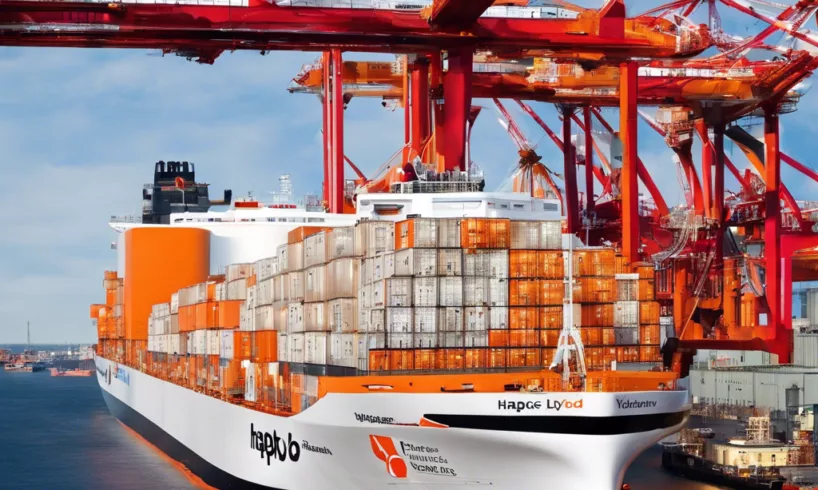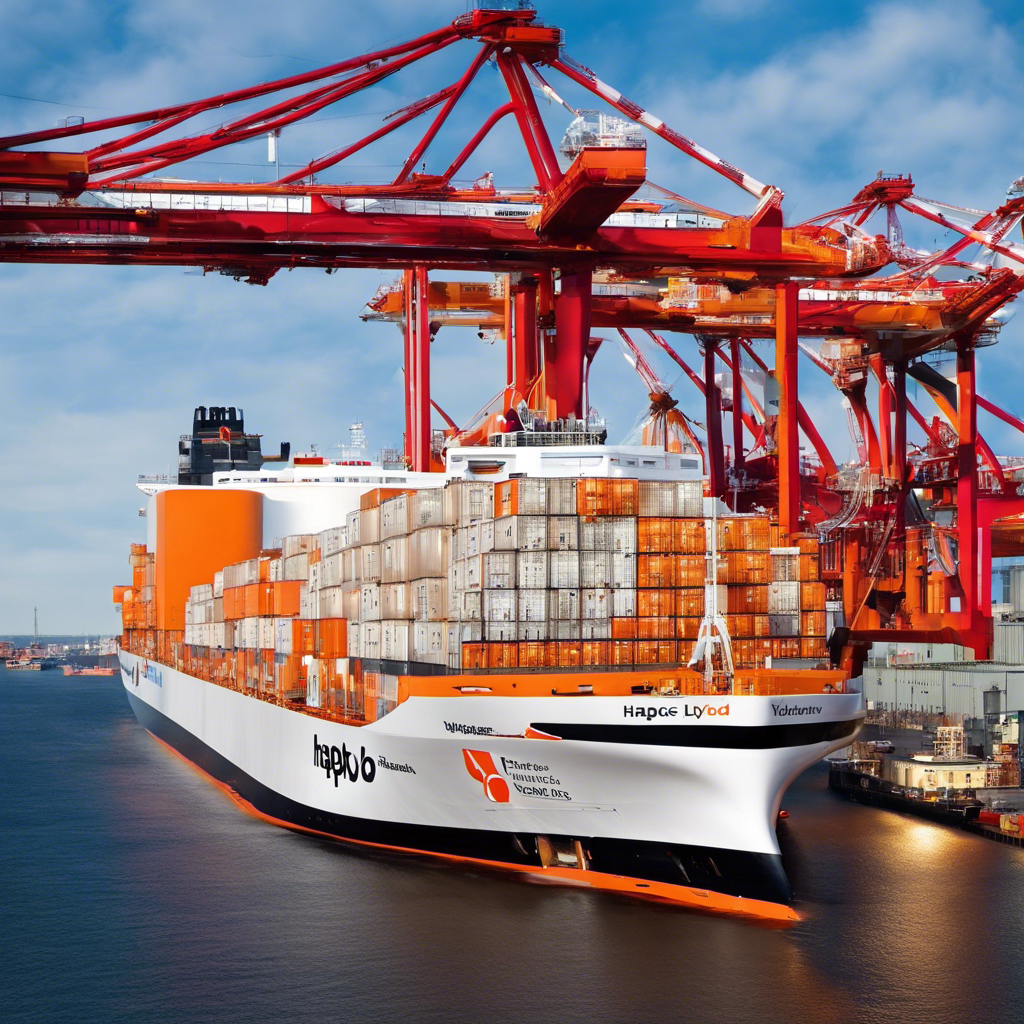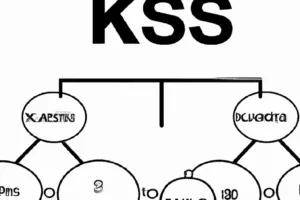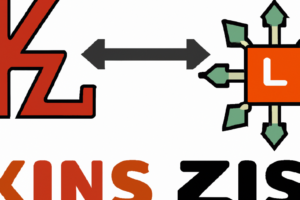
Revolutionizing Shipping: Hapag-Lloyd and Vodafone's Groundbreaking Adoption of KYX Technology
In an era where technology is rapidly reshaping industries, two global giants, Hapag-Lloyd and Vodafone, are leading the charge by embracing the transformative power of KYX technology. This groundbreaking innovation, a blend of AI, IoT, and blockchain, is poised to revolutionize the shipping and telecommunications sectors. This article, ‘Pioneering the Future: Hapag-Lloyd and Vodafone Embrace KYX Technology,' will explore how these two industry leaders leverage this cutting-edge technology to enhance operational efficiency, bolster security, and create unparalleled customer experiences.
As we venture into the heart of this digital revolution, this article will explore how Hapag-Lloyd, one of the world's leading shipping companies, and Vodafone, a multinational telecommunications conglomerate, integrate KYX technology into their core operations. We will delve into the nitty-gritty of how KYX technology works, its challenges and opportunities, and its potential impact on the shipping and telecommunications industries. This piece will also feature insights from industry experts, providing a comprehensive view of this technological leap.
1. Embracing Digital Transformation
The article highlights how Hapag-Lloyd and Vodafone are pioneering the future by embracing KYX technology. This move signifies a significant step in their digital transformation journey, showing their commitment to leveraging advanced technology to streamline operations and enhance customer experience.
2. Enhancing Efficiency and Transparency
These companies' adoption of KYX technology aims to enhance efficiency and transparency. The technology allows for real-time tracking and monitoring of shipments, significantly reducing delays and improving customer satisfaction.
3. Strategic Partnerships
The article underscores the importance of strategic partnerships in achieving digital transformation. Hapag-Lloyd and Vodafone's collaboration with KYX technology providers is a testament to their strategy of partnering with tech companies to stay ahead of the curve.
4. Potential for Industry-wide Impact
The adoption of KYX technology by industry giants such as Hapag-Lloyd and Vodafone could potentially have a wide-ranging impact on the logistics and telecommunications sectors, respectively. This move could set a precedent for companies in these industries to follow suit.
5. Future Prospects
Lastly, the article discusses the prospects of KYX technology. With its potential to revolutionize operations and customer experience, KYX technology is expected to gain broader acceptance in the coming years, thus reshaping the future of digital transformation in various sectors.
Revolutionizing Logistics with KYX Technology
The partnership between Hapag-Lloyd and Vodafone to implement KYX technology is set to revolutionize the logistics industry. The technology provides real-time tracking and monitoring of containers, significantly improving supply chain visibility. This marks a significant step forward in the digitization of the logistics sector, which has traditionally needed to be faster to adopt new technologies.
KYX technology, which uses IoT (Internet of Things) sensors and Vodafone's Narrowband IoT (NB-IoT) network, allows Hapag-Lloyd to monitor their containers' location, temperature, humidity, and vibration in real-time. This comprehensive visibility allows for more efficient route planning, improved cargo safety, and reduced lost or damaged goods. The technology also enables predictive maintenance, reducing downtime and increasing operational efficiency.
Setting a New Standard in Customer Service
Implementing KYX technology by Hapag-Lloyd and Vodafone improves operational efficiency and sets a new standard in customer service within the logistics industry. With real-time tracking, customers can monitor their cargo in transit, enabling them to plan their inventory and operations better. This level of transparency and control is unprecedented in the logistics industry and will likely become a key differentiator for companies in a highly competitive market.
Furthermore, the predictive analytics capabilities of KYX technology mean that Hapag-Lloyd can proactively manage potential issues before they become problems. This could include rerouting containers to avoid bad weather or performing maintenance on a container before it breaks down. This proactive approach to problem-solving significantly improves the customer experience, increasing customer loyalty and retention.
Driving Sustainability in the Logistics Industry
The adoption of KYX technology by Hapag-Lloyd and Vodafone also has significant implications for sustainability in the logistics industry. By improving route efficiency and reducing downtime, the technology can help to reduce fuel consumption and greenhouse gas emissions. Furthermore, improved visibility and control over cargo conditions can reduce wastage due to damaged or spoiled goods.
In addition, the use of NB-IoT technology, which is designed to be low power, further contributes to the sustainability credentials of this initiative. As companies face increasing pressure to reduce their environmental impact, adopting such technologies could become essential to their sustainability strategies.
Overall, the partnership between Hapag-Lloyd and Vodafone to implement KYX technology represents a significant step forward for the logistics industry. By improving operational efficiency, enhancing customer service, and driving sustainability, this initiative will profoundly impact the industry.
Revolutionizing Logistics with KYX Technology
With a significant shift in the logistics industry, Hapag-Lloyd and Vodafone have begun to deploy KYX technology in their operations. KYX, a cutting-edge technology, uses blockchain and artificial intelligence to provide real-time tracking of cargo shipments. This technology offers unprecedented transparency, allowing companies to monitor the status and location of their goods at all times.
The implications of this are profound. With KYX technology, companies can drastically reduce the amount of lost or misplaced cargo, saving millions of dollars annually. Furthermore, it allows for better planning and resource allocation, as companies can adjust their operations based on real-time information.
We might see a world where every shipment is tracked using KYX technology, eliminating the need for manual tracking and paperwork. This would not only increase efficiency but also significantly reduce the environmental impact of the logistics industry.
Enhancing Communication through KYX Technology
Another game-changer in the industry is applying KYX technology to improve communication between companies. Hapag-Lloyd and Vodafone are pioneering this trend, using KYX technology to create a secure, decentralized communication network.
This network allows companies to share information and collaborate more effectively, reducing misunderstandings and miscommunications that can lead to costly mistakes. It also provides a secure platform for sharing sensitive information, protecting companies from cyber threats.
Looking forward, this could revolutionize how companies communicate and collaborate. With a secure, decentralized network, companies could share information instantly and securely, speeding up decision-making processes and improving efficiency.
Creating a More Sustainable Future with KYX Technology
The most exciting trend is the potential for KYX technology to drive sustainability in the logistics industry. KYX technology can help companies reduce waste and improve efficiency by providing real-time tracking and improving communication.
For example, companies can plan more efficient routes by knowing exactly where their goods are, reducing fuel consumption and carbon emissions. Additionally, improved communication can reduce the risk of errors that lead to waste.
In the future, KYX technology could play a key role in creating a more sustainable logistics industry. Reducing waste and improving efficiency could help companies meet their environmental goals and contribute to a more sustainable future.
Unveiling the Partnership: Hapag-Lloyd and Vodafone
This section delves into the groundbreaking partnership between Hapag-Lloyd, the global shipping giant, and Vodafone, the telecommunications leader. We will explore the motivation behind this collaboration, the shared vision of the two companies, and how they plan to leverage their combined expertise to pioneer the future of their respective industries. This section will also provide a brief background on the two companies, highlighting their achievements and future ambitions.
Understanding KYX Technology: The Game-Changer
Here, we dissect the concept of KYX technology – its origin, functionality, and potential impact on various sectors. This section will explain in detail how KYX technology works, its unique features, and why it is a game-changer in today's digital age. We will also examine the potential challenges and solutions in implementing this technology.
Revolutionizing Shipping: Hapag-Lloyd's Vision with KYX
This section will focus on Hapag-Lloyd's vision for integrating KYX technology into its operations. We will examine the potential benefits and challenges and the anticipated impact on the shipping industry. Through case studies, we will illustrate how Hapag-Lloyd plans to leverage KYX technology to enhance efficiency, reduce costs, and improve customer service.
Transforming Telecommunications: Vodafone's Strategy with KYX
This section will delve into Vodafone's strategy for embracing KYX technology. It will highlight how the telecommunications giant plans to leverage this advanced technology to enhance connectivity, improve service delivery, and revolutionize the user experience. We will also discuss the potential implications of this strategy on the broader telecommunications industry.
Regulatory Landscape and Compliance
This section will discuss the regulatory landscape surrounding using KYX technology. We will examine current regulations, potential legal challenges, and how Hapag-Lloyd and Vodafone plan to ensure compliance. This section will also explore the role of regulatory bodies in shaping the future of KYX technology.
Impact on Stakeholders: Customers, Employees, and Investors
This section will analyze the potential impact of adopting KYX technology on various stakeholders, including customers, employees, and investors. We will discuss how this technology could alter the customer experience, change the workforce dynamics, and influence investment decisions.
Potential Risks and Mitigation Strategies
This section will discuss the potential risks associated with adopting KYX technology and how Hapag-Lloyd and Vodafone plan to mitigate these risks. We will explore various risk factors, including technological, operational, and financial risks, and discuss the strategies to manage these risks effectively.
Future Prospects: The Road Ahead for KYX Technology
In the final section, we will explore the prospects of KYX technology. We will look at the potential advancements in this technology, its potential application in other industries, and how it could shape the future of digital transformation. This section will also present expert opinions and forecasts on the future trajectory of KYX technology.
The Genesis of KYX Technology
KYX Technology traces its roots back to the early 21st century when the digital revolution was in full swing. As businesses became more reliant on technology, a robust and reliable system to protect digital assets became paramount. This led to the development of KYX Technology, a platform designed to provide a secure and transparent environment for businesses to operate.
KYX, an acronym for Know Your eXchange, was initially used in the financial sector to manage and mitigate risks associated with digital transactions. Its primary function was ensuring transactional data's integrity and confidentiality while facilitating seamless exchanges between parties.
Hapag-Lloyd's Early Adoption of KYX
Hapag-Lloyd, a leading global shipping company, was among the early adopters of KYX Technology. The company recognized the potential of KYX in enhancing its operational efficiency and security. In an industry where the exchange of information is vital, KYX provides a platform for secure and efficient data exchanges.
Hapag-Lloyd integrated KYX into its operations in the mid-2010s. The technology allowed the company to streamline its shipping processes, from booking to tracking, making it more efficient and customer-friendly. Moreover, KYX's robust security features ensured the protection of sensitive data, a critical aspect in an industry prone to cyber threats.
Vodafone's Embrace of KYX
Vodafone, a global leader in telecommunications, embraced KYX Technology around the same time as Hapag-Lloyd. The company saw in KYX a solution to its need for a secure and efficient data exchange platform. Vodafone's adoption of KYX marked a significant step in the telecom industry's digital transformation.
Vodafone's use of KYX Technology revolutionized its operations. It facilitated seamless communication and data exchange among its global branches, enhancing efficiency. Moreover, KYX's security features played a crucial role in protecting Vodafone's vast customer data, ensuring the company's compliance with data protection regulations.
The Evolution of KYX Technology
Over the years, KYX Technology has evolved to meet the changing needs of businesses. Today, it is used for secure data exchange and various other functions, such as identity verification, risk management, and compliance checks.
The evolution of KYX has been driven by advancements in technology, such as artificial intelligence and blockchain. These technologies have enhanced KYX's capabilities, making it a versatile tool for businesses across various sectors. For instance, KYX's integration with blockchain technology has allowed businesses to conduct secure and transparent transactions, thereby fostering trust among parties.
Pioneering the Future: Hapag-Lloyd and Vodafone's Current Use of KYX
Today, both Hapag-Lloyd and Vodafone continue to leverage KYX Technology in their operations. Technology has become an integral part of their business models, enabling them to stay ahead of the curve in their respective industries.
Hapag-Lloyd uses KYX to streamline its shipping processes, ensuring efficiency and security. The company also uses the technology for risk management, helping it to mitigate potential threats and maintain its reputation as a reliable shipping company.
On the other hand, Vodafone uses KYX for secure data exchange among its global branches and for identity verification of its customers. The technology has helped the company enhance customer service and ensure compliance with data protection regulations.
Indeed, the journey of KYX Technology, from its inception to its current use by industry giants like Hapag-Lloyd and Vodafone, is a testament to its potential to shape the future of business operations. As technology advances, it is expected that KYX will continue to evolve, offering even more benefits to businesses in the coming years.
1. What is KYX Technology?
KYX Technology is a cutting-edge technology that leverages artificial intelligence and big data to provide predictive analytics. It is designed to help businesses improve efficiency, reduce costs, and make more informed decisions by predicting future events or outcomes based on historical data.
2. How are Hapag-Lloyd and Vodafone leveraging KYX Technology?
Hapag-Lloyd and Vodafone use KYX Technology to enhance their operational efficiency and customer service. They are employing the predictive analytics capabilities of KYX to anticipate potential issues, streamline processes, and ultimately provide a better service to their customers.
3. What benefits does KYX Technology offer to these companies?
KYX Technology offers a range of benefits to companies like Hapag-Lloyd and Vodafone. These include improved operational efficiency, cost savings, and making more informed decisions. Additionally, it allows these companies to provide a better, more personalized service to their customers by predicting their needs and preferences.
4. How does KYX Technology work?
KYX Technology works by analyzing large amounts of historical data using artificial intelligence. It identifies patterns and trends in this data and uses this information to predict future events or outcomes. This predictive analytics capability allows businesses to anticipate potential issues, streamline processes, and make more informed decisions.
5. Is KYX Technology reliable?
Yes, KYX Technology is considered highly reliable. It uses advanced artificial intelligence and big data analysis techniques to provide accurate predictions. However, like any technology, its effectiveness can depend on the quality and accuracy of the data it is given to analyze.
6. Can other businesses benefit from KYX Technology?
Absolutely. While Hapag-Lloyd and Vodafone are pioneering its use in their respective industries, KYX Technology can benefit many businesses. Any company with access to large amounts of data and wants to improve its decision-making processes could benefit from using KYX.
7. How does KYX Technology improve customer service?
KYX Technology improves customer service by allowing businesses to anticipate customers' needs and preferences. Analyzing historical data can predict what a customer is likely to want or need in the future, allowing businesses to provide a more personalized and proactive service.
8. What are the potential drawbacks of using KYX Technology?
One potential drawback of using KYX Technology is that it requires access to large amounts of data to be effective. Companies that do not have access to this data may need help to leverage the benefits of KYX fully. Additionally, while KYX is generally considered reliable, its predictions are not 100% accurate and should not be the basis for business decisions.
9. How does KYX Technology fit into the broader digital transformation trend?
KYX Technology is a vital part of the broader trend of digital transformation. It represents a shift towards using data and artificial intelligence to improve business processes and decision-making. As companies embrace digital transformation, using technologies like KYX will become increasingly common.
10. Where can I learn more about KYX Technology?
More information about KYX Technology can be found on the company's official website. Additionally, numerous industry publications and online resources provide in-depth coverage of KYX and other similar technologies.
Misconception 1: KYX Technology is Exclusive to the Shipping Industry
One common misconception is that KYX technology is exclusive to the shipping industry, specifically Hapag-Lloyd. This is not the case. KYX technology, or Key Exchange technology, is a cryptographic protocol that allows two or more parties to exchange keys securely. This technology can be applied across various industries and is not exclusive to shipping. In the case of Hapag-Lloyd and Vodafone, they have embraced KYX technology to enhance their digital security and data protection capabilities. However, the application of this technology is more comprehensive than these companies or the shipping industry.
Misconception 2: Hapag-Lloyd and Vodafone's Partnership is Solely Focused on KYX Technology
Another misconception is that the partnership between Hapag-Lloyd and Vodafone is solely focused on implementing KYX technology. While it's true that the adoption of this technology is a significant part of their collaboration, there are other focuses. The partnership is a broader strategic alliance to drive digital transformation and innovation. This includes but is not limited to the use of KYX technology. Other areas of collaboration involve improving operational efficiency and customer service and exploring new digital solutions for logistics and telecommunications.
Misconception 3: KYX Technology Will Eliminate All Cybersecurity Threats
The third misconception is the perception that using KYX technology will eliminate all cybersecurity threats for Hapag-Lloyd and Vodafone. While KYX technology significantly enhances digital security by providing a secure method for key exchange, it does not necessarily eliminate all cybersecurity threats. Cybersecurity is a multifaceted issue that requires a comprehensive approach, including securing key exchange. It's essential to remember that while KYX technology is a significant step towards improving digital security, there are more silver bullet solutions for some cybersecurity challenges.
Embracing the Future: Hapag-Lloyd and Vodafone's Leap into KYX Technology
In conclusion, Hapag-Lloyd and Vodafone's adoption of KYX technology symbolizes a significant leap toward a more efficient and secure future in the shipping and telecommunication industries. This pioneering move, underscored by the collaboration between these two industry giants, enhances their operational efficiency and sets a new standard for others to follow. KYX technology's ability to provide real-time tracking, predictive analytics, and advanced security measures is a game-changer, and its integration into Hapag-Lloyd's shipping processes and Vodafone's telecommunication services demonstrates its vast potential.
Moreover, the successful implementation of KYX technology by Hapag-Lloyd and Vodafone highlights the importance of embracing digital transformation in today's competitive business environment. It's not just about keeping pace with technological advancements but also about leveraging these innovations to deliver improved services, ensure customer satisfaction, and ultimately drive business growth. The story of Hapag-Lloyd and Vodafone's adoption of KYX technology inspires other companies to explore and adopt innovative solutions in their respective industries.

George Smith, with over a decade in tech journalism, excels in breaking down emerging tech trends. His work, spanning tech blogs and print, combines in-depth analysis with clarity, appealing to a wide readership. George's pieces often explore technology's societal impact, showcasing his foresight in industry trends.







